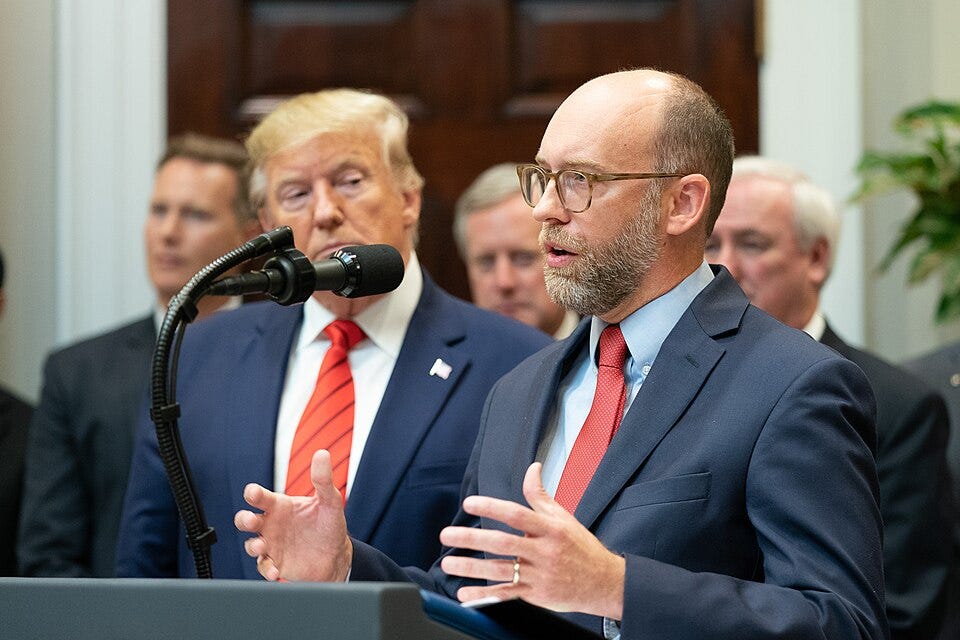
We’re excited to introduce Ritvik Thakur, a new Cato Institute Research Associate for Budget and Entitlement Policy, who joined our team last week. Ritvik returns to Cato after serving as an intern in the summer of 2024 and graduating in Economics from the University of Virginia this May. He’s residing in Silver Spring, MD and you’ll be seeing his byline more often on this Substack. Now for this week’s reading links and fiscal facts:
A small downpayment on reducing federal spending. Congress passed a $9 billion rescissions package last week, which will claw back foreign aid and public broadcasting funds. Dom Lett and Boccia called on the administration to Bring Back Rescissions this March, arguing that the process brings “transparency, legitimacy, and permanence to an executive cost-cutting process that has otherwise been characterized by its secrecy, chaos, and policy whiplash.” This rescissions package is a small but welcome step toward locking in DOGE savings and will hopefully present but a small downpayment toward further spending reductions. Congratulations to President Trump and OMB Director Russ Vought for successfully reviving a cost-cutting measure that hasn’t been deployed since the early 2000s. We love to see it!
Expanded senior tax deduction is a political handout, not sound policy. Peter Mallouk, CEO of Creative Planning, writes on X: “American households age 65–74 have over 10x the net worth of those under 35 [see chart below]. The 'Big, Beautiful Bill' just added a $6,000 bonus standard deduction—exclusively for taxpayers 65 and older. Is that really where the help is most needed?” The expansion of the senior deduction will accelerate the Social Security trust fund’s insolvency as fewer seniors will pay taxes on their benefits, reducing one of the program’s revenue sources. As we highlighted in a previous Debt Digest edition: “There is no sound policy reason to give [seniors] additional tax subsidies beyond the political incentive to give a tax break to a demographic that turns out reliably at voting booths.”
A rules-based Fed could improve performance and protect itself from political attacks. Cato’s Jai Kedia recommends the Federal Reserve switch from discretionary decision-making to a rules-based approach to improve its performance and shield itself from political pressure. In such a system, the Fed would follow a publicly known formula to set the federal-funds rate, with flexibility to adjust to exigent circumstances. According to Kedia, “macroeconomic outcomes are better when the Fed follows a rule than when it acts discretionarily.” As for how a rules-based approach could reduce political pressure on the Fed, Kedia notes: “Not that politicians will stop blaming the Fed even if it switches to a rules-based regime; blaming the Fed for poor economic outcomes is too easy and too accepted for politicians to stop doing so. The central bank can, however, instill more faith in the process by assuring markets that rate decisions are happening apolitically.”
The CIA’s venture capital firm. In the last edition of the Debt Digest, we covered the Pentagon’s investment fund. This week, we turn to the Central Intelligence Agency’s In-Q-Tel—the first government-sponsored venture capital firm founded in 1999. “In-Q-Tel uses CIA-supplied funds to make strategic investments in startup companies developing commercially focused technologies that are of interest to the CIA and greater intelligence community,” explained John T. Reinert of Kirkland & Ellis LLP in a 2013 paper. According to Sherwood News reporter Jon Keegan, In-Q-Tel received more than $1.2 billion in taxpayer money from 2011 to 2024, but it hasn’t been financially sustainable. As Keegan explains: “If you remove government grants from In-Q-Tel’s revenue numbers, after expenses they would have had a loss for the past 12 out of 13 years [see chart below].” As Reinart argued: “The CIA is not equipped to succeed in the notoriously perilous business of venture capital, and heightened ethical concerns surround the making of government-sponsored equity investments in private companies.” The former CEO of In-Q-Tel may have said it best: “Startups don’t speak government, and government doesn’t speak start-up.”
More subsidies won’t solve America’s housing affordability problem. Cato’s Norbert Michel questions the widely accepted story of a housing crisis, highlighting that when adjusting for home and household sizes, homes have become slightly more affordable over time, with the share of household income spent on housing decreasing since 1975. He acknowledges the effects of the COVID pandemic, noting that inflation drove the median home price up by almost $100,000. However, he critiques the calls for more housing subsidies, which would further disrupt the housing market: “Incidentally, most state and local policies restrict supply, and most federal policies boost demand, pushing up prices from both sides,” he writes. Michel concludes that narrowly focusing on housing prices is misguided: “[T]he problem is no more a housing affordability problem than it is any other type of affordability problem. The way out is to improve one’s ability to regularly earn more income, and that’s a broader economic problem.” One overlooked avenue to boost Americans’ incomes: reducing government spending and debt. The economic literature is clear that high and rising government debt-to-GDP slows growth. High debt crowds out more productive investments, raises interest rates, and risks elevating inflation. By prioritizing fiscal discipline, Congress can boost growth, restore market confidence, and secure higher incomes and a brighter economic future for Americans.






